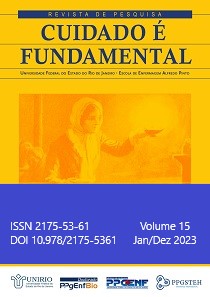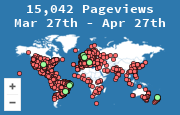Stress, quality of working life and coping with intensive nursing in the pandemic context: integrative review
DOI:
https://doi.org/10.9789/2175-5361.rpcfo.v15.12210Keywords:
Occupational Stress; Quality of life; Psychological Adaptation; Nursing.Abstract
Objective: to analyze, in the light of the literature, the quality of working life of Intensive Care Unit nurses, with emphasis on stressors and coping strategies during COVID-19. Method: integrative review carried out in October 2022, in LILACS, MEDLINE and SCIELO databases. Results: A total of 820 studies were located, and when inclusion and exclusion and reading criteria were applied, a sample of seven studies was obtained, from which the following categories emerged: stressors arising from the work environment; impacts of stress factors on the quality of working life; and coping strategies to overcome stressful situations. Final considerations: it is necessary to invest in the support of intensive care nursing, implementing structural and organizational measures in the work environment that consider their biopsychosocial state, in order to safeguard their resilience both in the context of COVID-19 and in future pandemics.
Downloads
References
Caram CS, Rezende LC, Montenegro LC, Amaral JM, Brito MJM. Ambiguidades no trabalho da equipe de saúde no contexto de uma Unidade de Terapia Intensiva. Rev. SANARE. [Internet]. 2016 [acesso em 19 de setembro 2022];15(1):15-24. Disponível em: https://sanare.emnuvens.com.br/sanare/article/view/923.
Aguiar LMM, Martins GS, Valduga R, Gerez AP, Carmo EC, Cunha KC, et al. Profile of adult intensive care units in Brazil: systematic review of observational studies. Rev. Bras. Ter. Intensiva. [Internet]. 2021 [cited 2022 set 19];33(4):624-34. Available from: https://doi.org/10.5935/0103-507X.20210088.
Zavalis A, Paula VG, Machado DA, Marta CB, Perez Junior EF, Santiago LC. O nível de estresse dos enfermeiros na Unidade de Terapia Intensiva. Rev. Pesq. Cuid. Fundam. [Internet]. 2019 [acesso em 19 de setembro 2022];11(1):205-210. Disponível em: https://doi.org/10.9789/2175-5361.2019.v11i1.205-210.
Kubo HKM, Campiolo EL, Ochikubo GT, Batista G. Impacto da pandemia do Covid-19 no serviço de saúde: revisão integrativa. Inter. Am. J. Med. Health. [Internet]. 2020 [acesso em 19 setembro de 2022];3:e202003046. Disponível em: https://doi.org/10.31005/iajmh.v3i0.140.
Costa NNG, Servo MLS, Figueredo WN. COVID-19 and the occupational stress experienced by health professionals in the hospital context: integrative review. Rev. Bras. Enferm. [Internet]. 2022 [cited 2022 set 19];75(Suppl1):e20200859. Available from: https://doi.org/10.1590/0034-7167-2020-0859.
Dantas ESO. Saúde mental dos profissionais de saúde no Brasil no contexto da pandemia por Covid-19. Interface. [Internet]. 2021 [acesso em 19 de setembro 2022];25(suppl1):e200203. Disponível em: https://doi.org/10.1590/Interface.200203.
Soares JP, Oliveira NHS, Mendes TMC, Ribeiro SS, Castro JL. Burnout-related factors in health professionals during the Covid-19 pandemic: an integrative review. Saúde Debate. [Internet]. 2022 [cited 2022 set 19];46(esp1):385-398. Available from: https://doi.org/10.1590/0103-11042022E126I.
World Health Organization (WHO). Constitution of the World Health Organization. [Internet]. 1946 [cited 2022 set 19]. Available from: https://apps.who.int/gb/bd/PDF/bd47/EN/constitution-en.pdf.
Miranda FMA, Santana LL, Pizzolato AC, Saquis LMM. Condições de trabalho e o impacto na saúde dos profissionais de enfermagem frente a Covid-19. Cogitare Enferm. [Internet]. 2020 [acesso em 19 de setembro 2022];25:e72702. Disponível em: https://doi.org/10.5380/ce.v25i0.72702.
International Labour Office (ILO). Emerging risks and new patterns of prevention in a changing world of work. [Internet]. 2010 [cited 2022 set 19]. Available from: https://www.ilo.org/wcmsp5/groups/public/@ed_protect/@protrav/@safework/documents/publication/wcms_123653.pdf.
Maturana APPM, Valle TGM. Estratégias de enfrentamento e situações estressoras de profissionais no ambiente hospitalar. Rev. Psc. Hospitalar. [Internet]. 2014 [acesso em 19 de setembro 2022];12(2):2-23. Disponível em: http://pepsic.bvsalud.org/pdf/ph/v12n2/12n2a02.pdf.
Souza MT, Silva MD, Carvalho R. Revisão integrativa: o que é e como fazer. Einstein. [Internet]. 2010 [acesso em 19 de setembro 2022];8(1):102-6. Disponível em: https://doi.org/10.1590/s1679-45082010rw1134.
Galvão TF, Pansani TSA, Harrad D. Principais itens para relatar revisões sistemáticas e meta-análises: a recomendação PRISMA. Epidemiol. Serv. Saúde. [Internet]. 2015 [acesso em 19 de setembro 2022];24(2):335-342. Disponível em: https://doi.org/10.5123/S1679-49742015000200017.
Santos CMC, Pimenta CAM, Nobre MRC. A estratégia PICO para a construção da pergunta de pesquisa e busca de evidências. Rev. Latino-Am. Enfermagem. [Internet]. 2007 [acesso em 19 de setembro 2022];15(3):508-11. Disponível em: https://doi.org/10.1590/S0104-11692007000300023.
Stillwell SB, Fineout-Overholt E, Melnyk BM, Williamson KM. Evidence-based practice, step by step: searching for the svidence. Am. J. Nursing. [Internet]. 2010 [cited 2022 set 19];110(5). Avaliable from: https://doi.org/10.1097/01.NAJ.0000372071.24134.7e
Brasil. Conselho Nacional de Saúde (CNS). Resolução nº 466, de 12 de dezembro de 2012. [Internet]. 2012 [acesso em de 19 setembro 2022]. Disponível em: https://conselho.saude.gov.br/resolucoes/2012/Reso466.pdf.
Abuatiq A, Borchardt C. The Impact of COVID-19: Nurses occupational stress and strategies to manage it. JONA. [Internet]. 2021 [cited 2022 out 15];51(12):600-5. Available from: https://doi.org/10.1097/NNA.0000000000001081.
Appel AP, Carvalho ARS, Santos RP. Prevalence and factors associated with anxiety, depression and stress in a COVID-19 nursing team. Rev. Gaúcha. Enferm. [Internet]. 2021 [cited 2022 out 15];42(spe):e20200403. Available from: https://doi.org/10.1590/1983-1447.2021.20200403.
Caliari JS, Santos MA, Andrechuk CRS, Campos KRC, Ceolim MF, Pereira FH. Quality of life of nurse practitioners during the COVID-19 pandemic. Rev. Bras. Enferm. [Internet]. 2022 [cited 2022 out 15];75(Suppl1):e20201382. Available from: https://doi.org/10.1590/0034-7167-2020-1382.
Conz CA, Braga VAS, Vasconcelos R, Machado FHRS, Jesus MCP, Merighi MAB. Experiences of intensive care unit nurses with COVID-19 patients. Rev. Esc. Enferm. USP. [Internet]. 2021 [cited 2022 out 15];55:e20210194. Available from: https://doi.org/10.1590/1980-220X-REEUSP-2021-0194.
Franco JA, Leví PLÁ. Feelings, Stress, and Adaptation Strategies of Nurses against COVID-19 in Guayaquil. Invest. Educ. Enferm. [Internet]. 2020 [cited 2022 out 20];38(3):e07. Available from: https://doi.org/10.17533/udea.iee.v38n3e07.
Hwang E. Factors Affecting the Quality of Work Life of Nurses at Tertiary General Hospitals in the Context of the COVID-19 Pandemic. Int. J. Environ. Res. Public. Health. [Internet]. 2022 [cited 2022 out 20];19(8):4718-31. Available from: https://doi.org/10.3390/ijerph19084718.
Şanlıtürk D. Perceived and sources of occupational stress in intensive care nurses during the COVID-19 pandemic. Intensive Crit. Care Nurs. [Internet]. 2021 [cited 2022 out 20];67:103107. Available from: https://doi.org/10.1016/j.iccn.2021.103107.
International Council of Nurses (ICN). Nurses: a voice to Lead - invest in nursing and respect rights to secure global health. [Internet]. 2022 [cited 2022 out 22]. Available from: https://www.icn.ch/node/1532.
Conselho Federal de Enfermagem (COFEN). Observatório da Enfermagem: profissionais infectados com Covid-19 informado pelo serviço de saúde. [Internet]. 2022 [acesso em 22 de outubro 2022]. Disponível em: http://observatoriodaenfermagem.cofen.gov.br/.
Organização Pan-Americana da Saúde (OPAS). Mais deve ser feito para proteger força de trabalho da enfermagem à medida que casos de COVID-19 aumentam nas Américas, afirma diretora da OPAS. [Internet]. 2022 [acesso em de 22 outubro 2022]. Disponível em: https://www.paho.org/pt/noticias/4-5-2022-mais-deve-ser-feito-para-proteger-forca-trabalho-da-enfermagem-medida-que-casos.
Word Health Organization (WHO). State of the world's nursing 2020: investing in education, jobs and leadership. [Internet]. 2020 [cited 2022 out 22]. Available from: https://www.who.int/publications/i/item/9789240003279.
Hirschle ALT, Gondim SMG. Stress and well-being at work: a literature review. Ciênc. Saúde Coletiva. [Internet]. 2020 [cited 2022 out 22];25(7):2721-36. Available from: https://doi.org/10.1590/1413-81232020257.27902017.
Murat M, Köse S, Savaşer S. Determination of stress, depression and burnout levels of front-line nurses during the COVID-19 pandemic. Int. J. Ment. Health. Nurs. [Internet]. 2021 [cited 2022 out 22];30(2):533-543. Available from: https://doi.org/10.1111/inm.12818.
Mo Y, Deng L, Zhang L, Lang Q, Liao C, Wang N, et al. Work stress among Chinese nurses to support Wuhan in fighting against COVID-19 epidemic. J. Nurs. Manag. [Internet]. 2020 [cited 2022 out 22];28(5):1002-1009. Available from: https://doi.org/10.1111/jonm.13014.
Li Y, Scherer N, Felix L, Kuper H. Prevalence of depression, anxiety and post-traumatic stress disorder in health care workers during the COVID-19 pandemic: a systematic review and meta-analysis. PLoS One. [Internet]. 2021 [cited 2022 out 22];16(3):e0246454. Available from: https://doi.org/10.1371/journal.pone.0246454.
Maqbali MA, Sinani MA, Al-Lenjawi B. Prevalence of stress, depression, anxiety and sleep disturbance among nurses during the COVID-19 pandemic: a systematic review and meta-analysis. J. Psychosom. Res. [Internet]. 2021 [cited 2022 out 22];141:110343. Available from: https://doi.org/10.1016/j.jpsychores.2020.110343.
Karabulut N, Gürçayır D, Aktaş YY, Kara A, Kızıloğlu B, Arslan B, et al. The effect of perceived stress on anxiety and sleep quality among healthcare professionals in intensive care units during the coronavirus pandemic. Psychol. Health Med. [Internet]. 2021 [cited 2022 out 22];26(1):119-130. Available from: https://doi.org/10.1080/13548506.2020.1856897.
Rattray J, McCallum L, Hull A, Ramsay P, Salisbury L, Scott T, et al. Work-related stress: the impact of COVID-19 on critical care and redeployed nurses: a mixed-methods study. BMJ Open. [Internet]. 2021 [cited 2022 out 22];11(7):e051326. Available from: https://doi.org/10.1136/bmjopen-2021-051326.
Li H, Cui Y, Efstathiou N, Li B, Guo P. Experiences of redeployed healthcare workers in the fight against COVID-19 in China: a qualitative study. PLoS One. [Internet]. 2022 [cited 2022 out 22];17(8):e0273429. Available from: https://doi.org/10.1371/journal.pone.0273429.
Dias EN, Pais-Ribeiro JL. O modelo de coping de Folkman e Lazarus: aspectos históricos e conceituais. Rev. Psicol. Saúde. [Internet]. 2019 [acesso em 22 de outubro 2022];11(2):55-66. Disponível em: http://dx.doi.org/10.20435/pssa.v11i2.642.
Ramos FP, Enumo SRF, Paula KMP. Teoria motivacional do coping: uma proposta desenvolvimentista de análise do enfrentamento do estresse. Estud. Psicol. [Internet]. 2015 [acesso em 22 de outubro 2022];32(2):269-79. Disponível em: https://doi.org/10.1590/0103-166X2015000200011.
Shen X, Zou X, Zhong X, Yan J, Li L. Psychological stress of ICU nurses in the time of COVID-19. Crit. Care. [Internet]. 2020 [cited 2022 out 22];24(1):200-3. Available from: https://doi.org/10.1186/s13054-020-02926-2.
Published
Versions
- 2023-09-21 (2)
- 2023-09-02 (1)
How to Cite
Issue
Section
License
Copyright (c) 2023 Revista de Pesquisa Cuidado é Fundamental Online

This work is licensed under a Creative Commons Attribution-NonCommercial-ShareAlike 4.0 International License.
TRANSFER AGREEMENT COPYRIGHT I transfer copyright of the article to the Journal of Care Survey is Fundamental - Online - RPCF, so it is accepted due to electronic publishing. The copyright includes the right to reproduce in whole or in part by any means, distributing that article, including figures, photographs, and any translations. The author can also print and distribute copies of your article, stating that since the rights belong to RPCF. I declare that this manuscript is original and has not been submitted for publication, in whole or in part to other online journals or not, so BMMC in the Annals of scientific events or book chapters.






























